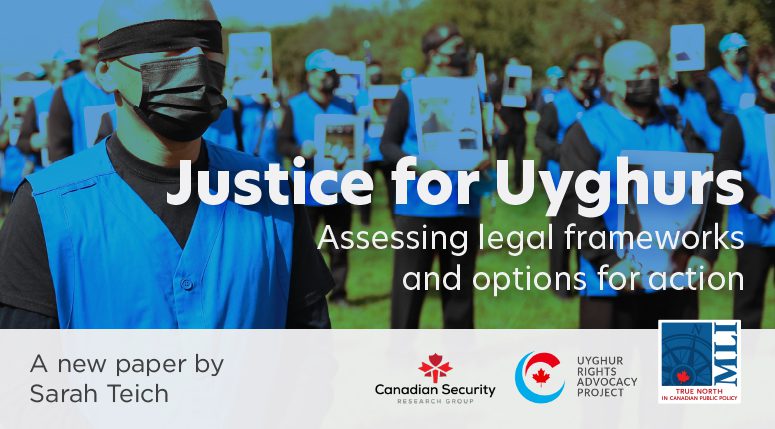Executive Summary
The Chinese Communist Party (CCP) is committing numerous crimes and abuses against the Uyghurs in Xinjiang (East Turkestan). There is pervasive surveillance; massive numbers of arbitrary detentions; widespread physical and sexual torture; medical crimes; killings; forced labour; and transnational repression. The Uyghur Tribunal and others have found the crimes committed against the Uyghurs amount to genocide pursuant to the 1948 UN Genocide Convention.
These crimes are in breach of China’s legal obligations. But the obligations under international law do not pertain solely to China. Every other state that is a party to the UN Genocide Convention has undertaken to prevent and to punish genocide, which means they have not only a moral obligation to take action to combat the Uyghur genocide, but also a legal one.
This paper summarizes the crimes against the Uyghur people and then outlines the viable options available to help address those crimes.
- Encourage the Office of the Prosecutor at the International Criminal Court (ICC) to open a preliminary examination into the situation. The ICC has specific jurisdictional constraints. However, certain crimes (namely, the crimes against humanity of deportation and persecution) fall within the jurisdiction of the Court.
- Refer the matter to the International Court of Justice (ICJ). Multiple human rights treaties, including the UN Genocide Convention and the Convention Against Torture, contain provisions that provide that disputes shall be submitted to the ICJ. Any state that has ratified those treaties could bring a dispute against the Chinese government for its violations of the Genocide Convention and/or the Convention Against Torture, and argue that the Chinese reservations under those provisions are invalid. An advisory opinion could also be sought.
- Engage the various UN human rights mechanisms. Generally, violations of internationally recognized human rights can be brought to the various UN human rights bodies, including human rights treaty bodies, special procedures, and the Human Rights Council. Because China has not ratified any of the relevant optional protocols, none of the human rights treaty bodies are empowered to receive individual complaints about China. However, complaints of human rights breaches may be lodged with the special procedures.
- Impose targeted sanctions using domestic law. Countries with Magnitsky or Magnitsky-style legislation may impose targeted sanctions on CCP officials responsible for atrocities committed against Uyghurs. In 2021, Canada, the US, the UK, and the European Union (EU) imposed sanctions on four individuals and one entity responsible for atrocities committed against the Uyghurs. Since then, the US has imposed sanctions on dozens of others. Further individuals and entities should be sanctioned.
- Engage in civil lawsuits in domestic courts. Civil lawsuits against the Chinese government could potentially be filed in domestic courts for injury or damage that occurs domestically due to transnational repression. Further, civil lawsuits may be pursued against companies that use Uyghur forced labour abroad.
- Criminally prosecute perpetrators using universal jurisdiction laws. The principle of universal jurisdiction can enable perpetrators of atrocity crimes to be prosecuted in domestic criminal courts, virtually anywhere, even if there is no link between the domestic system and the crimes committed. In Canada, this principle is enshrined in the Crimes Against Humanity and War Crimes Act. Other countries have similar legislation. Individuals responsible for atrocity crimes against Uyghurs should be prosecuted if they are physically present in any jurisdiction that allows for such prosecution.
- Use of ombudsman or other neutral arbiter. In April 2022, a coalition of 28 Canadian non-profit organizations submitted a complaint to the Canadian Ombudsperson for Responsible Enterprise (CORE), asking it to investigate 14 Canadian companies’ use of Uyghur forced labour. This use of an ombudsman or other neutral arbiter should be considered in other jurisdictions where such offices exist, following consultations with local lawyers.
- Pass novel legislation and/or a policy regarding forced labour. The United States recently passed legislation that presumes that goods from Xinjiang (East Turkestan) are made using forced labour, and stops them from entering the country. Other countries, including Canada, could pass similar legislation or institute a similar policy.
- Pass novel legislation and/or a policy regarding forced organ harvesting. In Canada, the proposed Bill S-223 is a general bill (not Uyghur- or China-specific) that addresses forced organ harvesting. Previous versions of the bill have received unanimous, bipartisan support. Bill S-223 should be prioritized and passed into law. Other countries may pass similar legislation.
- Pass novel legislation and/or a policy regarding Uyghur refugee resettlement.The CCP is engaged in efforts to have Uyghurs located outside of China detained and deported back to Chinese custody. The principle of non-refoulement obligatescountries to ensure they are not indirectly deporting Uyghurs back to China by returning them to these unsafe third countries. Democratic states, including Canada, should go further and take in Uyghur refugees.
Democratic states – and individual people – should not sit by knowing that atrocities are taking place against the Uyghurs in Xinjiang (East Turkestan). There are several options available for holding the Chinese Communist Party to account. This paper has listed many of them and calls for them to be pursued.





